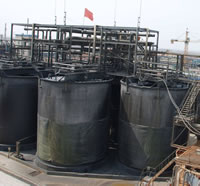 BacTech Mining Corporation is another step closer to building its bioleaching plant near Cobalt. The company has reported significantly improved metal recoveries from its most recent concentrate test work using its patented bioleaching technology, according to a January 26 news release.
BacTech Mining Corporation is another step closer to building its bioleaching plant near Cobalt. The company has reported significantly improved metal recoveries from its most recent concentrate test work using its patented bioleaching technology, according to a January 26 news release.
BacTech is performing metallurgical tests on tailings from Gold Bullion Development Corp.’s Castle Mine located in Gowganda.
This is a representative but small tailings deposit," said BacTech’s president Ross Orr. "It allows us to run 200,000 tonnes for a year out of this particular tailings site," although millions of tonnes of tailings exist throughout the area.
The objective is to neutralize arsenic-laden tailings within the historic Cobalt mining camp while at the same time, achieve significant metal recovery.
The January results showed improved recoveries of arsenic, gold, silver and cobalt over its November 2008 test results. Recent tests achieved more than 92 per cent recovery of arsenic, while gold, silver, and cobalt recoveries averaged more than 76 per cent.
The company is testing the effects of both gravity and flotation techniques to upgrade the tailings to produce concentrates suitable for bioleach test work. Its most recent round of testing combined both techniques, achieving higher metal recovery. Its November tests used only the gravity method. Further tests using only flotation techniques will be performed. Although they have not had to grind the tailings thus far, other tests using ground material will be carried out to determine the best concentrate, said Orr.
This technology is able to process concentrates with high arsenic values normally considered unacceptable for conventional processing methods like smelting or roasting. It has proven effective in producing a stable form of arsenic, making this an ideal project for environmental reclamation and metal recovery objectives.
Encouraged by these results, BacTech will perform a drill program on the tailings when weather permits to establish a NI 43-101 compliant resource base. It will be followed by a feasibility study.
"We hope to break ground in January, next year (for a demonstration plant)," Orr said. BacTech also submitted an application for funding to the Sustainable Development Technology Corporation.
As the company moves forward with preparations for its demonstration bioleaching plant, it will require knowledgeable people to run the plant. Consequently, BacTech has announced that it will sponsor a bacterial oxidation technician’s course to be run in partnership with Northern College’s Haileybury School of Mines at its Haileybury campus near Cobalt.
BacTech has identified a need for technicians trained in the operation of bioleach facilities. A team of experts will partner with Northern College faculty to design a course planned for September 2009. Ultimately, the goals are for trained technicians to obtain hands-on experience and future employment at bioleach plants.
"We are very pleased to have established this relationship with an institution that has such a long history in the Canadian mining industry. The potential is there for the Haileybury School of Mines to become a leader in providing graduates for the bioleaching industry," said Orr.


